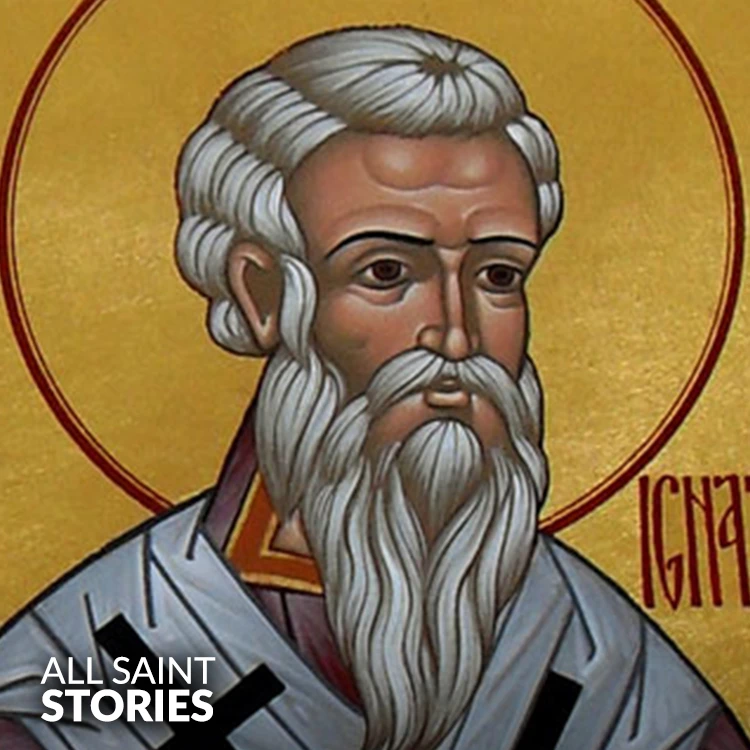"Saint Ignatius of Antioch, faithful servant of Christ, You courageously embraced martyrdom for the sake of the Gospel. Intercede for us, that we may grow in faith and boldness, and follow Christ’s path with unwavering devotion. Help us to live with the same love for the Church and fervor for the truth that you did. Amen."
ST. IGNATIUS OF ANTIOCH (DOCTOR OF THE CHURCH, MARTYR)
ST. IGNATIUS OF ANTIOCH (DOCTOR OF THE CHURCH, MARTYR)

St. Ignatius of Antioch, a prominent early Christian bishop and martyr, is celebrated for his theological writings and steadfast faith. As the bishop of Antioch, he emphasized the unity of the Church, the authority of bishops, and the true nature of Christ. Captured during the reign of Emperor Trajan, Ignatius was martyred by wild beasts in Rome around 107 AD. His letters to various Christian communities are some of the earliest Christian writings that shaped early Christian doctrine.
St. Ignatius of Antioch was born around 35 AD in Syria, though the exact date of his birth remains uncertain. He became the Bishop of Antioch, a significant center for early Christianity, and led the Christian community there during a time of both growth and persecution. Known for his deep theological insights, Ignatius wrote seven letters while on his journey to Rome, where he would face martyrdom. These letters were addressed to various Christian communities, including those in Ephesus, Magnesia, Tralles, and Rome, as well as to Polycarp, the Bishop of Smyrna.
In his letters, Ignatius strongly advocated for the authority of the bishop as central to the unity of the Christian Church. He emphasized the importance of the Eucharist, urging Christians to maintain faith in the true presence of Christ in the sacrament. Ignatius also dealt with early Christological debates, defending the full divinity and full humanity of Jesus Christ, countering the heresies of the time. He also condemned divisions within the Church, insisting that believers should remain united under their bishops and avoid schisms.
When the Roman Emperor Trajan ordered Ignatius' arrest, the bishop was sent to Rome to face execution in the arena. His final journey was marked by a deep sense of joy and anticipation, as he viewed his martyrdom as a means of sharing in Christ’s suffering. Ignatius was condemned to be devoured by wild beasts in the Colosseum. He met his death courageously around 107 AD, choosing not to escape his fate, but to embrace it as a final witness to his faith in Christ.
St. Ignatius' martyrdom made him one of the most revered figures in early Christianity. His writings have significantly shaped Christian theology, particularly concerning the structure and nature of the Church, the role of the Eucharist, and the person of Jesus Christ. His legacy endures, and he is venerated as one of the Doctors of the Church, recognized for his theological contributions and his role in the development of Christian doctrine.
Video Not Found
The information you see here may be either accurate or might contain some discrepancies, as it is gathered from various sources. If you believe that any part of the details about this saint is incorrect or incomplete, we kindly invite you to share your suggestions or corrections with us. Your insights are invaluable in helping us ensure that we provide the most accurate and reliable information.
We encourage you to use the form on the left to submit any corrections or additional information you may have. Whether it's a small detail or a larger correction, we will carefully review your submission and update the information accordingly. Your contributions will not only help us maintain the integrity of the content but also benefit others who seek to learn more about this saint. We greatly appreciate your assistance in making our information more accurate and complete.
Please rest assured that your personal details will remain confidential, and your suggestions will be handled with the utmost care. Together, we can ensure that the information about this saint is as accurate and informative as possible. Thank you for your time and contribution!
If you have any suggestion about ST. IGNATIUS OF ANTIOCH (DOCTOR OF THE CHURCH, MARTYR)
Your suggestion will help improve the information about this saint. Your details will not be disclosed anywhere.
© 2025 Copyright @ www.allsaintstories.com




 English
English
 Italian
Italian
 French
French
 Spanish
Spanish
 Malayalam
Malayalam
 Russian
Russian
 Korean
Korean
 Sinhala
Sinhala
 Japanese
Japanese
 Arabic
Arabic
 Portuguese
Portuguese
 Bantu
Bantu
 Greek
Greek
 German
German
 Dutch
Dutch